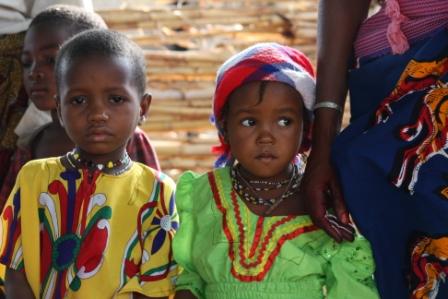As of 7 February, health ministries in high-risk countries reported 2,298 cases, with a 13-percent fatality rate. Burkina Faso has reported the highest number of cases, but Togo has experienced the highest fatality rate, where 25 of 108 infected people died.
The World Health Organization (WHO) described the situation as "alarming".
Mamoudou Harouna Djingarey, a WHO epidemiologist and meningitis expert, told IRIN it was still not clear why infections were spreading earlier than expected. "This [timing] is a sign of a major epidemic risk if no action is taken," he warned. Extensive meningitis outbreaks tended to occur every eight to 10 years, he said, but were now occurring about every four years.
In the 2009 meningitis season, 14 African countries reported a total of 78,416 suspected cases, including 4,053 deaths, the largest number of infections since the 1996 epidemic.
Studies are being carried out to determine whether climatic and environmental factors might be influencing the extent of the current epidemic. Djingarey told IRIN that infections had also been reported further south than usual, including in Uganda, Kenya and Democratic Republic of Congo.
Burkina Faso
On 17 February the Health Ministry in Burkina Faso reported 1,251 meningitis cases, with a 15.4 percent fatality rate. This time last year there were 25 percent less infections, but a similar percentage of deaths.
The disease has reached epidemic proportions in Pama in the east, Titao in the north, Sapouy in the centre west, and Batié in the southeast, defined by WHO as areas where at least 10 out of 100,000 people are infected. Three other districts with half as many reported infections are on alert, according to Burkina Faso's Ministry of Health.
Vaccinations have been carried out in Pama, Titao and the centre west. "If we can react quickly the numbers will drop," Health Ministry epidemiologist Jean Ludovic Kambou told IRIN.
WHO recommends vaccinating everyone aged from 2 to 29 years and living in an epidemic zone, as well as people in neighbouring areas that are on "alert". If the country does not have enough vaccines, it can request no-cost or minimal-cost vaccines from a meningitis vaccine stock managed by WHO. Alejandro Costa, a WHO vaccine scientist, told IRIN no countries have requested vaccines as of 19 February.
Costa told IRIN 100,000 doses of vaccine from the stockpile had been sent to Chad, which did not have vaccines on hand but was facing an epidemic in the southern regions of Mandoul and Logone Orientale. Chad's Ministry of Health said 42,000 people in the southern town of Doba needed vaccination.
On 19 February the government reported 507 meningitis infections that have led to 56 deaths, an 11 percent fatality rate.
pt/bo/dd/he
This article was produced by IRIN News while it was part of the United Nations Office for the Coordination of Humanitarian Affairs. Please send queries on copyright or liability to the UN. For more information: https://shop.un.org/rights-permissions





